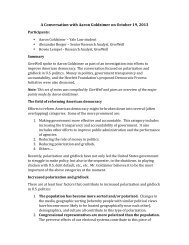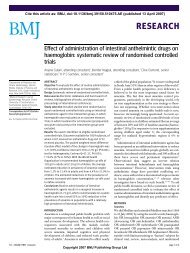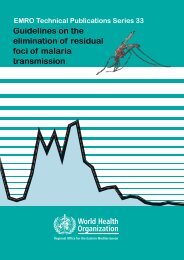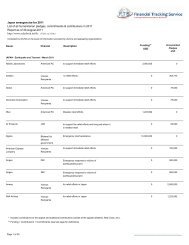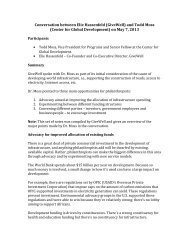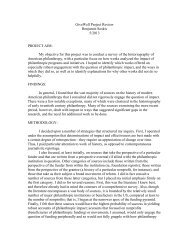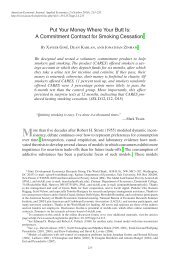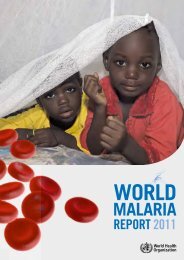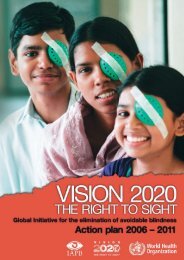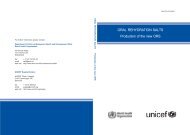Annual Report 2005 - Doctors Without Borders
Annual Report 2005 - Doctors Without Borders
Annual Report 2005 - Doctors Without Borders
You also want an ePaper? Increase the reach of your titles
YUMPU automatically turns print PDFs into web optimized ePapers that Google loves.
© Petterik Wiggers<strong>2005</strong>project supportEthiopiaAn MSF physicianexplains to a youngpatient how to takethe antimalariatreatment known asartemisinin-basedcombination therapy.17us annual report <strong>2005</strong>of the region. In May <strong>2005</strong>, MSF used mobileclinics to bring medical care and food toapproximately 60,000 long underservedpeople in the Gambella region of southeasternEthiopia. In the northwest, MSFran programs for people suffering fromthe deadly disease kala azar. MSF startedantiretroviral treatment for nearly 500people living with HIV/AIDS in the northwesterntown of Humera. MSF supportedmalaria treatment in 10 government healthfacilities that serve some 300,000 peoplein the southern Damot Gale district. In theCherrati district of the Somali region—hometo approximately 75,000 people—MSF rana primary care program.GEORGIA $1,950,000International staff: 9 National staff: 63Treating tuberculosis andaiding the excludedMSF treated tuberculosis including itsmultidrug-resistant strain in Abkhazia.Through a medical clinic, dispensary, andmobile clinic in the capital, Tbilisi, MSFprovided an average of 790 consultationsper month, mostly for elderly people, orphans,pregnant women, and isolatedmothers without income. In addition, MSFsupported the surgical department of thedistrict hospital in Akhmeta, providing careto some of the 2,000 Chechen refugeesliving in Georgia’s Pankisi Valley and to thelocal population of approximately 40,000.GUATEMALA $925,000International staff: 21 National staff: 96Expanding access toHIV/AIDS careIn Guatemala City, Puerto Barrios, andCoatepeque, MSF provided antiretroviraltreatment to more than 1,900 people livingwith HIV/AIDS—constituting half of allGuatemalans receiving this life-extendingtreatment. Another 1,800 people receivedcare for opportunistic infections in thesefacilities. In Chiquimula, MSF screenedchildren for Chagas, an endemic parasiticdisease, to locate those whose disease wasat the acute phase, which is still treatable.MSF also ran a project in Guatemala Citythat provided free health care and psychologicalcounseling to more than 700children and young adults living on thestreets. In October <strong>2005</strong>, MSF providedwater-and-sanitation assistance, shelter,and relief supplies to some 40,000 peopleaffected by Tropical Storm Stan.GUINEA-BISSAU $608,150International staff: 10 National staff: 73Battling choleraMSF responded to a cholera epidemic thatsickened more than 23,000 people byestablishing 2 treatment centers and supporting15 other government structures.GUINEA $600,000International staff: 20 National staff: 277Treating infectious diseases andresponding to emergenciesMSF staff trained doctors and healthworkers to manage tuberculosis. In theCommunal Medical Center in Conakry, thecapital, and in the prefecture hospital ofGuéckedou, MSF provided comprehensiveHIV/AIDS care to more than 300 people.In addition, MSF assisted thousands ofLiberian and Ivorian refugees living in thesoutheastern prefecture of N’Zérékoré.MSF also supported the treatment ofnearly 700 people during a cholera outbreakin Conakry.Innovating Malnutrition TreatmentCapitalizing on the availability of a new, ready-to-use therapeutic food, MSF developed an effective medicalprotocol for outpatient care of acute malnutrition. During <strong>2005</strong>, MSF treated 63,000 severely acutemalnourished children in Niger with a 90 percent cure rate. More than three-quarters of these children neverInnovationhad to be hospitalized.



